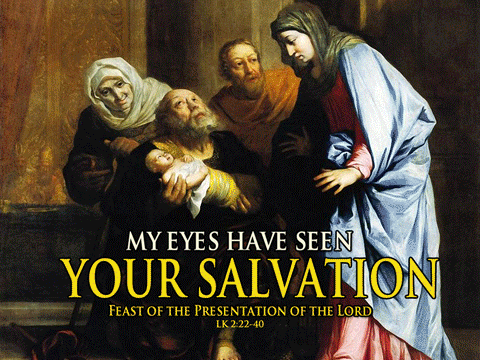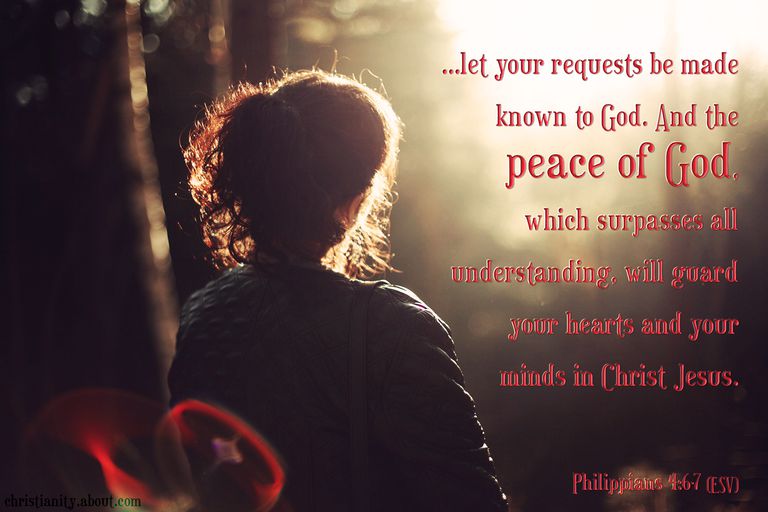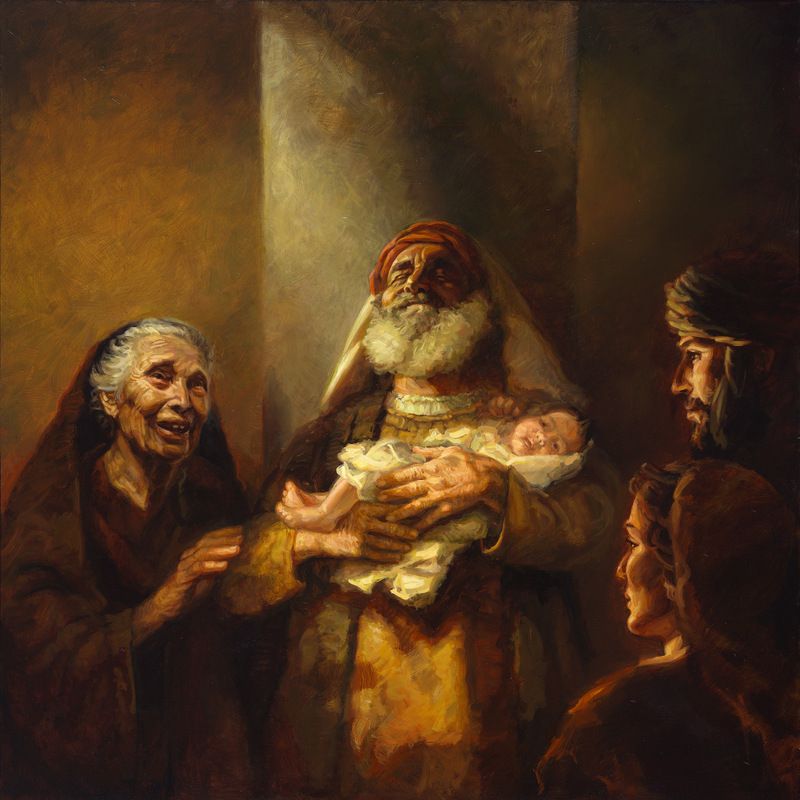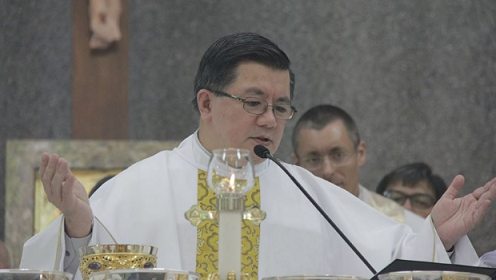4th Sunday - Presentation of Our Lord
Malachi 3:1-4; Ps. 23: 7-10; Hebrews 2:14-18; Gospel of Luke 2:22-40

Preached by Msgr Philip Heng, SJ at Cathedral of Good Shepherd, Singapore on 2 February 2020
 On this Feast of the Presentation of our Lord, as the Infant Jesus is presented to God in the Temple, where “every first-born male must be consecrated to the God”, you and I too are called to offer and consecrate our lives to God and live in the holiness of God’s Will and Ways. To live this “consecration” God invites the religious Catholic Christian to take the vows of poverty, chastity and obedience. However, even as not every Christian is called to live such a life of vowed consecration, every Christian is called to live a life of “holiness” that is in accordance to God’s Will and Ways.
On this Feast of the Presentation of our Lord, as the Infant Jesus is presented to God in the Temple, where “every first-born male must be consecrated to the God”, you and I too are called to offer and consecrate our lives to God and live in the holiness of God’s Will and Ways. To live this “consecration” God invites the religious Catholic Christian to take the vows of poverty, chastity and obedience. However, even as not every Christian is called to live such a life of vowed consecration, every Christian is called to live a life of “holiness” that is in accordance to God’s Will and Ways.
Let us begin our reflection by taking note that every good Christian who is sincere and mature about wanting to live a meaningful, wholesome and fulfilling life /knows that the Christian faith is not about hoping that there be no problems in life. To live a meaningful and wholesome life is also to embrace the challenges that come our way, and the crosses that God chooses to place on our shoulders, as we the disciples of Jesus follow Him as our Crucified Lord and Saviour.
To do so out of love for God our Father is to live in the wisdom of what it means as living a “holy life”. You and I want to live a “holy” life. However, more concretely, what does living a holy life mean and be like, you may ask?
Marian, a good practicing Catholic, not her real name graciously shared this true story of herself with me. She said, “When I was working full-time, I had a female boss (Jane, not her real name) who wasn’t very well-liked by our colleagues. There was a lot of backbiting about her. However, I could see that she was badly misjudged and misunderstood. In her distress, she would often confide in me about her work challenges.”
“Gradually, the management tried to side-line Jane, while at the same time, began to entice me to step up to “overshadow” her. People applauded and praised everything I did and spoke much about her shortcomings. Jane could see all the attention I was getting and slowly, she grew cold and distant towards me. Then one day, our regional boss pulled me aside and told me that he was planning to fire Jane and would like to promote me to take over her job.”
“He dangled a big pay cheque, glossy title, jet-setting lifestyle and spoke of the lucrative career path with many benefits . . . He asked me to think about it and get back to him in the next couple of days. He wanted to be sure I would take the job before he fired Jane.”
“The temptations to accept the offer were very strong. Moreover, I was only in my early 30’s and married with one child at that time. I could argue both ways – take the offer because of all the attractions, or turn down the offer because the extensive travel needed would take me away from my family; and deep within me, I felt this option would also be betraying Jane, my boss.”
 “I pondered and prayed . . . To cut the long story short, I declined the offer. The moment I did, I felt a deep and overwhelming peace and joy that were beyond words. I spent the next several years helping Jane navigate through the complex expectations and politics of the company. We spent much time together. I came to realise that she was a Christian, and this drew us even closer together. We worked as a team and did very well together. In the process I discovered the truly beautiful person that Jane was. She flourished and continued to work for the same company and finally, retired after 18 years. Till today, we are still very good friends.”
“I pondered and prayed . . . To cut the long story short, I declined the offer. The moment I did, I felt a deep and overwhelming peace and joy that were beyond words. I spent the next several years helping Jane navigate through the complex expectations and politics of the company. We spent much time together. I came to realise that she was a Christian, and this drew us even closer together. We worked as a team and did very well together. In the process I discovered the truly beautiful person that Jane was. She flourished and continued to work for the same company and finally, retired after 18 years. Till today, we are still very good friends.”
My brothers and sisters in Christ, Marian could have like most people, given in to the temptations of the materialistic and secular attractions and “easily” justified her decision to accept what her boss offered her by telling herself that this was a “golden opportunity not to be missed.” However, Marian’s “holiness” comes from her seeking of God’s Will with great sincerity and maturity of her faith. To have such a disposition Marian was very clear that she needed God’s Light, Love and Strength. So she truly begged God to reveal His Will to her.
In her discernment, Marian admits that on her own, without God’s graces, she says, “I am sure that my stubborn sinfulness will lead me away from what God truly wants of me. Far from being a ‘saint’, God knows that I am a wretched sinner.” Enlightened and empowered by the Holy Spirit, Marian was able to transcend all the “conflicting and confusing voices” within her, and made a firm decision, for the greater good of her family and her integrity towards her boss Jane. As a result, she experienced an overwhelming spiritual peace and joy of God’s affirmation.
My sisters and brothers in Christ, in today’s Gospel, we too have as great models of our faith, the Prophet Simeon and the Prophetess Anna. Both of them represent the continuity of the great prophets of Israel of the past. In their holiness, they held on firmly to the hope of witnessing the promise that the Messiah will come, be fulfilled during their life-time. So, they prayed, fasted, and served in the Temple day and night with great fidelity; waiting for the day when the Messiah would come. In short, the holiness of their lives made them so in tuned with God’s Presence in their lives that when the Infant Messiah was presented in the Temple, by His parents Mary and Joseph, they were able to recognise Him as the awaited Messiah.
 And so, prophet Simeon exclaimed, “Now, Master, You can let Your servant go in peace, just as you promised; because my eyes have seen the Salvation which You have prepared for all nations to see, a Light to enlighten the pagans and the glory of Your people Israel.”
And so, prophet Simeon exclaimed, “Now, Master, You can let Your servant go in peace, just as you promised; because my eyes have seen the Salvation which You have prepared for all nations to see, a Light to enlighten the pagans and the glory of Your people Israel.”
The Prophetess Anna too came by just at that moment and began to praise God; and she spoke of the child to all who looked for the deliverance of Jerusalem.
My brothers and sisters in Christ, let us also very importantly note that in this great event of the Presentation of Jesus at the Temple, the infant Jesus is presented as the “Light to the Gentiles who live in darkness and thus, Jesus as Saviour of all peoples, and not solely for the Salvation of the Israelites, the Chosen Race.
And so, let us on this Feast of the Presentation of the Lord remember that Jesus is calling each of us personally to be the light of Christ to all peoples, by living a life of holiness; a life that like Prophet Simeon, Prophetess Ann and Marian in our story, that is in-tuned with God’s Presence in all the situations of our lives.
In responding to this call, let us also remember that Holiness cannot be attained through a narrow focus of our own needs and even our family needs alone. We know that when Jesus proclaims the Gospels of Salvation, He proclaims Himself as the Saviour of peoples of all nations, all race, all religions, all cultures and indeed for peoples of all rank in society; and with preferential love for the poor, the homeless, the refugees, and all the different people who are marginalised and exploited in the secular society, including and especially those who are rebelling against God and are living in the darkness of sin.
To all these people, including us, Jesus the Saviour is offering Eternal Life and Happiness. And, it is in this invitation of Jesus that we are specially reminded today to live a life of “Holiness” that is in-tuned with God’s Will and living His Will at all times.
To put it differently, and more simply, some of us may ask, “Does being “holy” mean praying the Rosary, chanting the Divine Mercy chaplet, contemplating the Gospels and coming to Mass and receive Holy Communion every day? What about those who disagree with such views of holiness and assert that if we have a good and compassionate heart that respects and does not harm any person, then that alone is “holiness”; prayer and Mass are unimportant? Is this view also true? What then is living a “holy life mean?”
My brothers and sisters in Christ, let me first clarify that to live a life of “holiness” is neither prayer alone without good deeds or good deeds alone without prayer. This is because both prayer and good deeds are needed, and they are both inseparable. For us to grow in “holiness” we need a good and sound prayer life to help us build a personal and intimate relationship with God. And such a relationship with God cannot be strong and deep, unless it is shown through the concrete witness of the deeds of love, mercy, compassionate love, and selfless service, as Marian’s authentic living in our true story has shown us.
 And so My sisters and brothers in Christ, as I conclude, drawing from the life of Marian, as a good example of what “holiness” can be like, a good question to reflect on if you and I want to grow in the holiness of our daily living with God is, “Do we have the humility to admit that you and I are sinners, when we encounter challenges? “Are we humble enough to acknowledge that any good that you and I can do, can only come from God’s Light and Love?”
And so My sisters and brothers in Christ, as I conclude, drawing from the life of Marian, as a good example of what “holiness” can be like, a good question to reflect on if you and I want to grow in the holiness of our daily living with God is, “Do we have the humility to admit that you and I are sinners, when we encounter challenges? “Are we humble enough to acknowledge that any good that you and I can do, can only come from God’s Light and Love?”
And in seeking the depth of this ‘humility’, we also need to search our hearts to ask ourselves, “Do we, like Marian, put the needs of others before our own needs, and above all, does our love for Jesus prevail over everything else?” If we do, then we can happily say that there are indications, that we are living a life of “holiness” and in accordance to God’s Will, like Marian in our story, and Simeon and Anna, in the Gospel. And in living God’s Will we can be sure that, we too will surely live a life of peace and Joy . . . as we put God at the centre of our lives.
And additionally, if we truly want to take our God-centred life a step even further, then let us learn from the prophet Simeon and the prophetess Anna, that when they were able to consecrate and give their whole, mind, heart, soul and strength to searching for God’s Will, regardless of how long and how challenging this may be and become . . . they were both able to sense the promptings of the Holy Spirit and then able to see that the Infant Jesus who was presented in the Temple by His parents, Mary and Joseph, was indeed truly the Messiah, the Saviour and Lord of the world.
This means that if we too are able to put God at the centre of our lives and have God as the foundation of all our relationships, vocation and all that we do and live for, then we can be sure that like Marian in our story, and Simeon and Anna, in the Gospel, we too will be able to develop a discerning heart that will be able to see and find God in all things and situations of our lives, regardless of how painful and challenging they maybe and will be able to live our lives in serving God’s Greater Glory; for with God, Jesus assures us that nothing is impossible. What would our answer be to Jesus today?
Msgr Philip Heng, S.J.

homepage zähler from 4th February 2020
